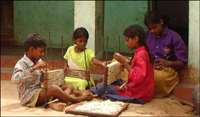Seventy boys working at factory rescued in India

Seventy boys embroidering garments in small, squalid factories were found and rescued by activists in India just days after ten 10-year-old children were discovered sewing clothes for retailer Gap Inc.
The boys, between the ages of 8 and 14, were mostly the children of poor farmers in Bihar, India's most impoverished eastern state, said Kailash Satyarthi of the group Bachpan Bachao Andolan, or Save the Children Mission.
They had been brought to New Delhi to work in small embroidery factories, he said. The work requires the use of very fine needles and glittering synthetic fibers to make long saris worn by Indian women.
The raids on the factories highlight the widespread problem of child labor in India. On Sunday, Britain's Observer newspaper reported that it had found children as young as 10 making clothes with Gap labels in a factory in New Delhi.
Gap responded quickly, saying the factory was being run by a subcontractor who was hired in violation of Gap's policies, and none of the products made there would be sold in its stores.
On Monday, activists rescued 14 children working in the Shahpur Jat neighborhood of New Delhi.
Satyarthi led his volunteers to nearly a dozen sweatshops in the Khanpur neighborhood on Thursday and took the rescued children to a nearby police station. The employers fled the area to avoid arrests.
"After police formalities, we will try to send them back to their parents," Satyarthi said. His organization has rescued nearly 1,400 child workers in the past year, he said.
Gulzar Ahmed, 12, said he was paid 3,000 rupees (US$75; Ђ52) a month for working 12 to 15 hours a day.
However, 14-year-old Ahmed Bilour said he was only given enough money for food because he was still learning embroidery.
The working and living conditions in the sweatshops were grim, with the boys packed into filthy rooms where they sewed all day.
Trade Minister Kamal Nath said earlier this week that activists were exaggerating the problem of child labor in the country.
He warned that bad publicity might prompt rich countries to limit imports from poor nations like India.
India's transformation in the past decade into an emerging economic power has done little to alleviate widespread poverty and the problems that go along with it, such as child labor.
The government estimates that 13 million children work, many in hazardous industries such as glassmaking, where such labor has long been banned. Rights activists place the number as high as 60 million, with one estimate saying that 20 percent of India's economy is dependent on children under 14.
Subscribe to Pravda.Ru Telegram channel, Facebook, RSS!

